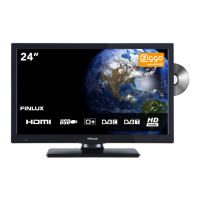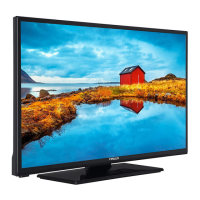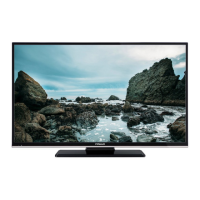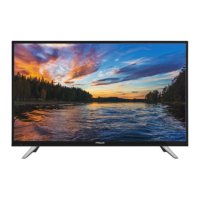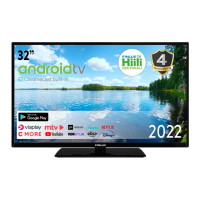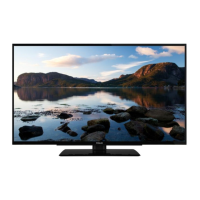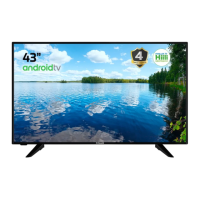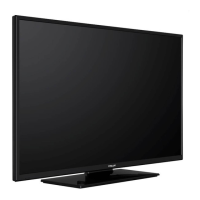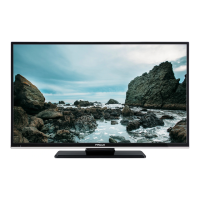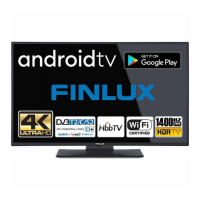Do you have a question about the Finlux FIN26FLD905HU and is the answer not in the manual?
Covers initial introduction, preparation steps, and safety precautions for the TV.
Covers crucial safety aspects like avoiding moisture, heat, flames, lightning, and proper servicing.
Provides guidance on waste disposal, EU country specifics, headphone volume, and general warnings.
Details on energy saving features and environmental considerations for TV usage.
Explains how to enable energy-saving mode to reduce power consumption.
Guidance on seeking professional help for repairs and maintenance.
Information on connecting various external systems like cable TV, PCs, and other equipment.
Details the functions of each button on the television's remote control.
Describes the TV's physical buttons and operating modes.
Explains the various input and output ports located on the rear of the TV.
Details the CI slot, component video, USB, and audio/video inputs on the side of the TV.
Instructions for connecting the TV to the power supply and an aerial.
Guidance on connecting USB devices for media playback and file viewing.
Steps to connect the TV to a computer for displaying PC screen images.
Instructions for connecting a DVD player using HDMI, Component, or Scart.
Describes connecting other equipment via Scart and using side AV connectors.
Instructions for inserting batteries into the remote control handset.
Detailed steps for turning the TV on, switching to standby, and powering it off completely.
How to choose between different connected input sources like TV, HDMI, or PC.
Explains how to operate the TV using its physical buttons for volume and program selection.
Details how to use the remote control for volume, program selection, and menu navigation.
Guides through the initial setup process, including language, country, and channel scanning.
Covers basic operations like changing channels, displaying information, and using the EPG.
Explains how to access and use the EPG to view program schedules and information.
Details how to navigate, move, delete, rename, and lock channels in the channel list.
Overview of the IDTV menu structure, including access to Channel List and Programme Guide.
Instructions for using teletext features, including navigation, subcode pages, and reveal information.
Information on adjusting picture aspect ratios and selecting various picture modes.
Setup for timers and managing conditional access for pay TV channels.
Details the main TV setup options including configuration, language, and installation.
Settings for Dolby D Digital, Hard of Hearing, and Audio Description for enhanced sound experience.
Covers receiver upgrade, over-air download, and general system configuration.
Managing maturity lock, menu lock, and setting a PIN for parental control.
Adjusting time settings, audio description, preferred language, and relative volume.
Enabling or disabling the standby search feature, specific to certain countries.
Adjusting language preferences and accessing the installation menu for channel setup.
Step-by-step guide to perform an automatic scan for digital and analogue channels.
Procedure for performing a manual search for specific channels based on multiplex entry.
Accessing and browsing media files stored on a USB device.
How to view JPG image files, including slideshow options and full-screen viewing.
Instructions for playing MP3 audio files from a USB device.
Details on how to play video files, including controls for play, stop, and pause.
Options for adjusting picture mode, brightness, contrast, colour, and colour temperature.
Adjustments for volume, equalizer, balance, and sound mode settings.
Customizing audio equalizer presets and enabling Automatic Volume Limiting (AVL).
Accessing and configuring sleep timer, child lock, language, and zoom settings.
Settings for speaker balance, headphone volume, and selecting sound modes like Mono or Stereo.
Options for blue background, menu background, menu timeout, and teletext language.
Introduction to the Install menu for program, band, channel, colour, sound, and fine-tuning adjustments.
Configuring program numbers, bands, channel scans, colour system, sound system, and fine-tuning.
Instructions for managing program names, moving programs, deleting programs, and using APS.
Specific installation options available when the TV is in AV mode, including colour system and program storage.
Adjusting PC picture settings like autoposition, H/V position, phase, and dot clock for optimal display.
Detailed settings for PC picture adjustments including brightness, contrast, and colour temperature.
How to view program details, sound indicators, and zoom mode information on screen.
Options for selecting different picture modes like Dynamic, Natural, and Cinema for optimal viewing.
Guide to changing the TV's aspect ratio using various zoom modes like Auto, 16:9, 4:3, and Cinema.
Instructions for using teletext features, including navigation, subcode pages, and reveal information.
Guidance on resolving issues like image persistence, no power, poor picture, no sound, and remote control problems.
Table listing supported PC input resolutions, refresh rates, and frequencies.
Table detailing AV and HDMI signal compatibility for various input sources and types.
List of supported video, music, photo, and subtitle file formats for USB playback.
Technical specifications for TV broadcasting standards, reception channels, and digital reception.
Details on panel dimensions, weight, operating voltage, and power consumption.
Guidelines for the proper disposal of old equipment and batteries according to EU regulations.
Crucial safety instructions for connecting the TV to the mains supply, including wire color coding.
| Screen Size | 26 inches |
|---|---|
| HDMI Ports | 2 |
| USB Ports | 1 |
| Display Resolution | 1366 x 768 |
| Tuner Type | DVB-T/C |

